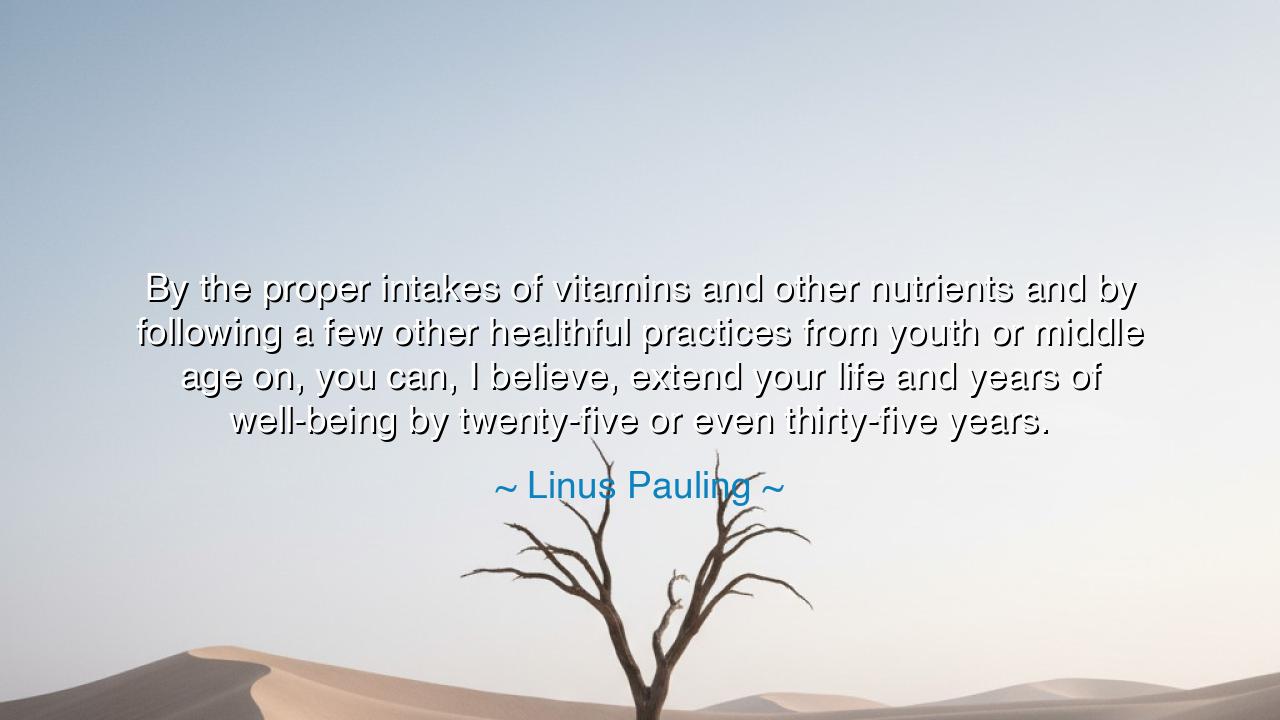
By the proper intakes of vitamins and other nutrients and by
By the proper intakes of vitamins and other nutrients and by following a few other healthful practices from youth or middle age on, you can, I believe, extend your life and years of well-being by twenty-five or even thirty-five years.






“By the proper intakes of vitamins and other nutrients and by following a few other healthful practices from youth or middle age on, you can, I believe, extend your life and years of well-being by twenty-five or even thirty-five years.” — Linus Pauling
Thus spoke Linus Pauling, the great alchemist of the modern age — not of gold, but of life itself. A man of science and spirit, twice crowned with the Nobel Prize, he sought not only to understand the structure of matter but the essence of vitality. In these words, he offers not merely medical advice, but a philosophy of longevity — the belief that life, if lived with wisdom and care, can be stretched like a golden thread, woven with strength and purpose far beyond its expected length. He reminds us that the body is not a vessel doomed to decay, but a temple of balance, whose endurance depends upon the harmony between nature’s gifts and human discipline.
Pauling’s insight was not born of idle speculation. He stood at the intersection of chemistry and compassion, studying the building blocks of life — the molecules and nutrients that sustain the flesh and fire of human existence. He believed that within every atom of the foods we eat lies a potential for health, and that ignorance of these small things could lead to the downfall of the greatest beings. His advocacy of vitamins, particularly vitamin C, was revolutionary in its time — mocked by some, revered by others — yet rooted in the ancient wisdom that the body, when nourished with purity and intention, possesses the power to heal itself.
To understand the heart of this teaching, one must recall that health is not merely the absence of disease, but the presence of vitality — the inner strength that allows one to rise with the sun, to think clearly, to love deeply, and to endure the trials of time. Pauling speaks not of eternal life, but of extended well-being — the art of living long and living well. His vision was not of frailty prolonged, but of vigor sustained. He saw that by tending the garden of the body through proper nutrition, exercise, and mental serenity, one could delay the shadows of decline and walk the earth with brightness for decades longer than fate might otherwise allow.
The ancients, too, knew this truth. In the East, the sages of Taoist philosophy spoke of cultivating the ch’i, the vital energy that flows through all things, by harmony of diet, breath, and thought. In Greece, Hippocrates, the father of medicine, taught that “food be thy medicine, and medicine be thy food.” Linus Pauling, standing centuries later, renewed this ancient wisdom through the lens of modern science. He turned the invisible — the molecular — into the miraculous. He revealed that by honoring the smallest elements of life, we could master the greatest of destinies: the slow, graceful unfolding of our days.
Consider, too, the story of Jeanne Calment, the Frenchwoman who lived to the age of 122. When asked her secret, she said simply: “I smile. I keep busy. And I eat well.” Though she never spoke of vitamins, her life embodied Pauling’s wisdom. She lived with discipline and delight, nourishing her body and her soul alike. Her longevity was not an accident, but the fruit of balance — a symphony of moderation, laughter, and care. In her and in Pauling’s teaching, we see that the fountain of youth is not hidden in myth, but flows quietly through the choices we make each day.
Yet there is more to this than biology. When Pauling spoke of healthful practices, he was speaking also of hope, of purpose, and of gratitude for the gift of life. The man who cherishes his body learns also to cherish the world; for to care for oneself is to honor the creation that made us. Each meal, each moment of rest, becomes an act of reverence. In this way, the quest for longevity becomes not a fear of death, but a celebration of life — a way of living so consciously, so joyfully, that the years stretch of their own accord.
Practical counsel for the seeker:
-
Treat your body as a sacred vessel; feed it with wholesome nourishment, clean air, and pure water.
-
Begin in youth or middle age, for prevention is wiser than cure.
-
Let moderation, movement, and mindful living be your daily companions.
-
And above all, remember that health is not a number of years, but the radiance of your being.
For as Linus Pauling teaches, the path to a long and flourishing life is neither secret nor distant. It lies within your hands — in every bite of food, every breath of gratitude, every act of self-care. The atoms of your body await your command; treat them with reverence, and they will serve you faithfully. To live long is not to deny mortality, but to honor the miracle of existence — to stretch each day, not in length alone, but in light, until even time itself bows in respect to the life well-lived.






AAdministratorAdministrator
Welcome, honored guests. Please leave a comment, we will respond soon